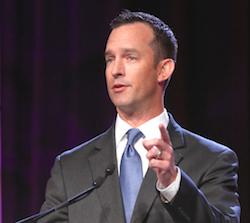
Quality and advocacy are the solutions to the challenges confronting assisted living and other areas of long-term care, leaders of the American Health Care Association / National Center for Assisted Living told those attending the opening session of the organizations’ annual meeting Monday in Nashville, TN.
The gathering attracted approximately 4,300 registrants, including exhibitors, according to AHCA/NCAL. The first day of the annual meeting followed NCAL Day, which drew approximately 250 people on Sunday, as well as other educational offerings.
AHCA/NCAL President and CEO Mark Parkinson reminded Monday’s crowd of the announcement of his appointment at the annual meeting six years ago in Long Beach, CA. “I think some people were excited when I was announced, not so much because I was a former governor but because Stacy and I were one of you,” he said. “Stacy and I really did build and own and operate and work every single day in our assisted living facilities and skilled nursing facilities.”
Parkinson confessed, however, that “when we opened up our first assisted living facility, we had no idea what we were getting into. We really didn’t.”
The year was 1996, he explained, and he and his wife had three children under the age of 7, and each worked more than 50 hours a week at their law firm and were involved in many community activities. Additionally, Parkinson was a state senator in Kansas.
“We thought we would be able to continue to do all those things and that we would build this one — just one — assisted listing facility and it would be kind of off to the side. We’d check on it every once in a while to make sure it was doing OK. It would be a hobby,” he said. “Well, I think back and wonder how we could have been so naive as to think that an assisted living facility would run itself, and I’m convinced it’s because we didn’t understand the types of people who lived in our buildings.”
His experience as a business owner and as leader of AHCA/NCAL have taught him three keys to success for the LTC industry, Parkinson said: Stay united, stay politically strong and deliver on quality.
And success is important for many reasons, he added.
“In many professions, people can quit and it doesn’t really make any difference,” Parkinson said. “We don’t have that luxury. Millions of people every year live in our buildings, and they are counting on us. They are supported by caregivers that are also in the millions that are counting on us, and of course we employ millions of people that are counting on us.”
‘A whirlwind’ 16 months
NCAL Executive Director Scott Tittle described his first 16 months in the position as “a whirlwind.”
“I’m continually amazed by the vast and rapid movement in assisted living,” he said.
Codifying the quality of care within assisted living communities will advance the profession, he said. “Looking at what’s coming down the pike for assisted living providers, we know quality metrics are what consumers are demanding, what governments are requiring and what payers will soon be tracking.”
Tittle noted the four new quality measures just added to the LTC Trend Tracker and the record number of assisted living communities that entered AHCA/NCAL’s Quality Awards and won this year.
“We’ll continue to make strides thanks to our collective membership that made quality a priority before it was ever dictated by a government body,” he said, “because you all know what it takes. You know who your residents are, what they need better than any bureaucrat in Washington.”
NCAL will continue to fight to keep assisted living regulated at the state level, Tittle said, “not to prevent progress, but to ensure it. …We must tell our story and build relationships with those who can influence our profession now. And many of you have, through political events, tours of your communities or meetings up on The Hill. Our message is getting out, but we must continue to beat that drum.”
 Increasing acuity, increasing regulation
Increasing acuity, increasing regulation
NCAL Board Chairman Chris Mason (pictured) marked his first year in the position but has worked in the long-term care field for decades.
The CEO of Senior Housing Managers, based in Wilsonville, OR, pointed out that during his career, assisted living regulation in Oregon has grown from filling 22 pages to filling 125 pages. Also, residents used to need assistance with an average of 1.7 activities of daily living, but “now that number is closer to nine,” he said.
“What began as a social model with a medical conscience in many states is now a medical model with a social conscience,” Mason said, adding, however, that the industry still includes many operators that focus on a social model.
“Regardless, our world is changing, and we have to change with it,” he said. To succeed, Mason added, providers must integrate more technology into their operations, partner with others and learn more about diseases, such as Alzheimer’s, that affect residents.
“I’m excited at how far we’ve come. It indicates that assisted living is evolving and becoming an increasingly important part of the healthcare continuum,” Mason said, adding, however, that “this kind of progress means greater responsibility and additional scrutiny.”
Nonetheless, he said, “There’s a misconception that the only advocates for our seniors and individuals with disabilities are the regulators. There are more than 3,000 advocates sitting in this room right now.”
The session’s keynote speaker, futurist Kenneth Gronback, peppered with humor his insights into future senior living and LTC residents and workers.
“If you want to predict the future, it’s simple,” he said. “Do the math.”
Monday’s additional highlights included educational sessions and an exhibit hall with hundreds of vendors. The meeting concludes Wednesday.
(Photos courtesy of AHCA/NCAL)



